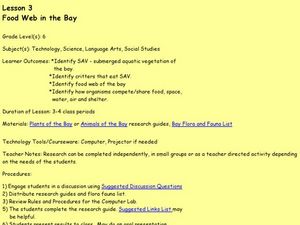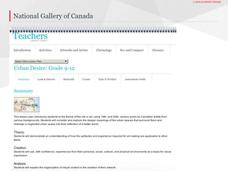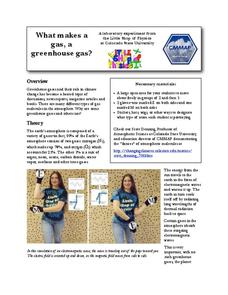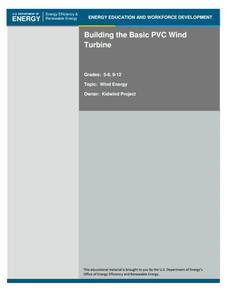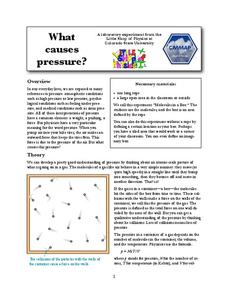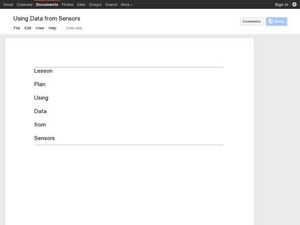Curated OER
Land Safely...
Learners model the preparation needed for a soft-landing on a planet or object in space. They do this by packaging a raw egg with certain material, and dropping the egg from a given height to test the packaging effectiveness.
Curated OER
Ar.... What Gives?
Students investigate the properties of air through inflated objects. In this physical science instructional activity, students examine gas as a state of matter. Student push on inflated objects and note the space the gas has taken up...
Space Awareness
Model of a Black Hole
Even light cannot leave the force of a black hole! Learners use a model to explore the gravitational force of a black hole. An elastic bandage and heavy ball serve to create the hole, while marbles become the victims of its strong force.
Habitat Conservation Trust Foundation
Greenhouse Gas Game
You will need to gather a number of tokens, bags, and other various game components in order to incorporate this activity into your curriculum. Different tokens represent carbon dioxide, methane, and nitrous oxide. Printable 8.5"x11"...
Cornell University
Alka-Seltzer Rockets
Blast off! An engaging hands-on activity has pupils create rockets powered by Alka-Seltzer. They learn about the physics behind these rockets throughout the process.
Curated OER
Food Web in the Bay
Sixth graders study the food web in a bay. In this food web lesson, 6th graders investigate the SAV- submerged aquatic vegetation of a bay including their predators, and how the organisms eat, have proper living space and water. They...
National Gallery of Canada
Urban Desire
Urban spaces are often overlooked and broken down. Offer your pupils the opportunity to reimagine an urban space. Learners examine and discuss works of art related to this theme and consider their own communities. Small groups then...
Curated OER
Unit IX: Worksheet 2 - Impulsive Force
Here are nine motion problems for physics fanatics to solve. Topics are pretty typical: rifles firing bullets, freight train cars colliding, astronauts gliding through space, balls being thrown. Pupils compute recoil speed, combined...
New Mexico State University
Lab 6: Kepler's Laws
A 15-page package thoroughly teaches your physics or astronomy learners about Kepler's three laws of planetary motion. Each one is stated and explained. Class members answer questions, solve problems, and participate in the classic...
Curated OER
Understanding the Cosmic Microwave Background (CMB)
How did our universe really begin? Explore the Science Big Bang Theory and Cosmic Microwave Background (CMB) with this multiple activity-based lesson that demonstrates that the increase of density due to the decrease of temperatures,...
BioEd Online
Muscle Fibers
What better way to learn about muscle than by dissecting one? Using cow muscle (beef), learners compare bundles of yarn to muscle fibers as they explore each. The supplemental reading about astronauts losing muscle mass in space and what...
American Museum of Natural History
Thinking in the Three Dimensions
Discover different dimensions with paper folding. Pupils first read about zero, one, two, and three dimensions, and then learn about the fourth dimension, time. They then use origami to create models of shapes in three dimensions and use...
NASA
Just How Far is That Star?
Pupils often wonder how we know the distance to various stars. Starting with a thought experiment and progressing to a physical experiment, they determine the brightness and distance to various stars. The evaluation requires critical...
Curated OER
Planet Impact!
An amazing information-packed lesson plan allows your space scientists to crash a virtual comet into Jupiter and learn how the angle, distance, speed, and mass influence the outcome. Click on "Back to the Lesson" to access the...
Curated OER
Water Alchemy
After reading "Aquatic Alchemy," an article about recapturing water for reuse when in space, your class will use calcium hydroxide or hydrated lime to purify cloudy water. Geared toward high school chemistry or environmental science...
Exploratorium
Touch the Spring
Concave mirrors and the images they produce are traditional topics in the physics classroom. This resource explains how to set up an investigation of them, and it provides you with the explanation of concepts.
Colorado State University
What Makes a Gas, a Greenhouse Gas?—The Carbon Dioxide Dance
Investigate a heated topic in environmental science. Scholars team up to play the parts of gas molecules in the atmosphere. As the teacher moves about, acting as the electromagnetic wave, learners react as their molecules would to the...
US Department of Energy
Building the Basic PVC Wind Turbine
Here is a comprehensive and well-written lesson plan that results in learners building a standard wind turbine. Once built, teens can design a variety of experiments to test different factors. This activity is a noble undertaking that...
Curated OER
Balls & Hoops : Fun with Balls and Tubes
Learners race to keep these balls rolling. In this early childhood physical education lesson, students experiment with cause and effect as they work with different heights of cardboard tubes.
University of Washington
Kepler’s Laws
Introduce your physics or astronomy class to Kepler's laws of planetary motion with this straightforward worksheet. It covers the basic concepts of each and has learners answer questions to demonstrate their grasp on them. You could use...
Curated OER
Observation and Inference
Assess your young scientists' understanding of the difference between observation and inference with this 20-question multiple choice quiz. It reviews a variety of physics and astronomy concepts, such as solar eclipses and sunspots, the...
Colorado State University
What Causes Pressure?
Are you feeling the pressure? Let loose a little with a kinesthetic activity that models molecular motion in a closed space! The activity varies conditions such as volume and temperature and examines the effects on molecules.
NASA
Christa's Lost Lesson: Effervescence
How are chemical reactions affected by gravity? Learners explore the phenomenon of effervescence as part of the Christa's Lost Lessons series. They compare findings in an experiment on effervescence to a video of a similar experiment in...
Curated OER
Using Data from Sensors
Beginning with a discussion about using technology to collect data, this resource includes a video about the next Mars rover as an example. Young scientists are taught that filtering is necessary before collected data can be analyzed....







